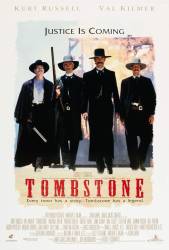Other mistake: When the Earp Brothers first arrive at Tombstone Fred White is telling them about the Cowboys and says "there's three of them now," the camera then shows four people wearing the red sash of the Cowboys.

Tombstone (1993)
1 other mistake - chronological order
Directed by: George P. Cosmatos
Starring: Kurt Russell, Val Kilmer, Bill Paxton, Charlton Heston, Sam Elliott, Michael Biehn, Powers Boothe, Dana Delany, Jason Priestley
Revealing mistake: When Wyatt Earp and the actress, whom he marries later in the movie, meet on horseback, they go on a fast paced ride that concludes after going down a steep hill. If you look at the actress' feet, you will see she is riding side-saddle - a very difficult feat considering the riding they do. If you look closely you can see her real leg, safely on the other side of the horse. The side-saddle leg must be fake.
Johnny Tyler: Is something on your mind?
Wyatt Earp: Just want to let you know you're sittin' in my chair.
Johnny Tyler: Is that a fact?
Wyatt Earp: Yeah, it's a fact.
Johnny Tyler: Well, for a man who don't go heeled you run your mouth kind of reckless, don't you?
Wyatt Earp: No need to go heeled to get the bulge on a tub like you.
Johnny Tyler: Is that a fact?
Wyatt Earp: Mm-hmm. That's a fact.
[Johnny Tyler stands up.]
Johnny Tyler: Well, I'm real scared.
Wyatt Earp: Damn right, you're scared. I can see that in your eyes.
[Wyatt walks up to Johnny as Johnny reaches for his gun.]
Johnny Tyler: All right now.
Wyatt Earp: Go ahead. Go ahead, skin it. Skin that smoke wagon and see what happens.
Johnny Tyler: Listen, mister, I-I'm gettin' awful tired of your-
[Wyatt slaps Johnny hard in the face.]
Wyatt Earp: I'm gettin' awful tired of your gas. Now jerk that pistol and go to work.
[Johnny doesn't do anything and Wyatt slaps him in the face again.]
Wyatt Earp: I said throw down, boy.
[Wyatt slaps Johnny harder and when Johnny turns to look at Wyatt his mouth is bleeding.]
Wyatt Earp: You gonna do somethin' or just stand there and bleed?
[Johnny still doesn't do anything.]
Wyatt Earp: No? I didn't think so.
Trivia: Val Kilmer has been quoted as saying that screenwriter Kevin Jarre insisted the actors wear real wool costumes, in accordance with the time period. During the scene in the Birdcage Theater, Val Kilmer says, a thermometer was placed on the set, and it read 134 degrees Fahrenheit. Kilmer suggested jokingly that this was the reason Doc Holliday killed so many people: "It's just, like, he wore wool in the summer, in the Arizona territory, and that made him mad."
Question: What is the name of the theatrical song in the Faust play, and who is the original composer and symphony?
Join the mailing list
Separate from membership, this is to get updates about mistakes in recent releases. Addresses are not passed on to any third party, and are used solely for direct communication from this site. You can unsubscribe at any time.
Check out the mistake & trivia books, on Kindle and in paperback.




Answer: Danse macabre by Camille Saint-Saëns.